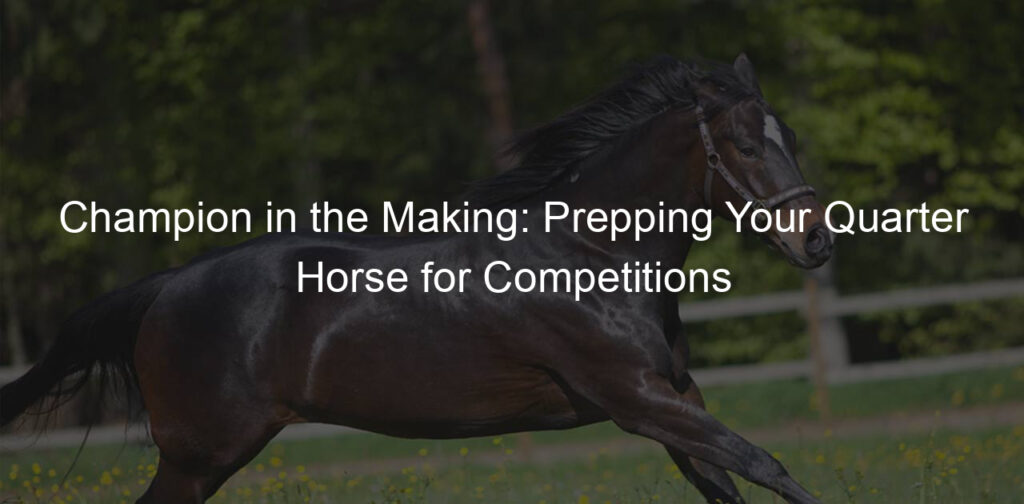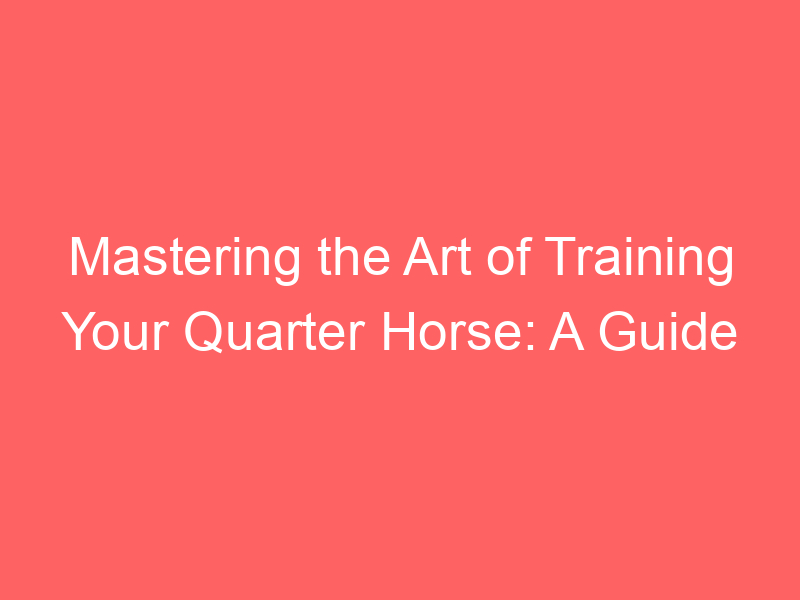Introduction to Quarter Horse Training
Hey there, horse lovers! Today, we’re going to dive into the exciting world of Quarter Horse training. Whether you’re a newbie or a seasoned horse owner, this guide will give you a fresh perspective on training these magnificent creatures. So, saddle up and let’s get started!
- Understanding the basics of Quarter Horse Training
- Importance of training your Quarter Horse for competitions
Before we start, let’s get to know our star – the Quarter Horse. Known for their speed and agility, Quarter Horses are a popular choice for competitive events. But, just like any athlete, they need proper training to shine.
Training a Quarter Horse is all about building a strong relationship based on trust and understanding. It’s not just about teaching them tricks or commands. It’s about understanding their personality, their strengths, and their weaknesses. It’s about working together as a team to achieve your goals.
Remember, every horse is unique. What works for one might not work for another. So, it’s important to be patient and flexible in your training approach. Learn more about Quarter Horses here.
Now, let’s talk about why training your Quarter Horse for competitions is so important. Competitions can be a fun and rewarding experience for both you and your horse. But, they can also be challenging and stressful without proper preparation.
Training helps your horse understand what’s expected of them in a competition. It helps them build the skills and confidence they need to perform at their best. It also helps you, as the rider, understand your horse better and communicate more effectively with them.
But, training isn’t just about winning competitions. It’s also about ensuring the safety and well-being of your horse. A well-trained horse is less likely to panic or get injured during a competition. So, training is a win-win for everyone!
So, are you ready to start your Quarter Horse training journey? Stay tuned for more tips and tricks in our upcoming sections. Happy training!
Competition Preparation for Horses
Getting ready for a horse competition? It’s not just about the day of the event. There’s a lot of preparation that goes into making sure your horse is ready to compete. Let’s talk about the physical preparation needed for your horse to be in top shape for the competition.
Physical Preparation
Physical preparation is key to your horse’s performance. It’s about building strength, endurance, and agility. Here’s how you can do it:
- Developing a Training Schedule
- Importance of Regular Exercise and Conditioning
Just like humans, horses need a consistent training schedule to build their strength and endurance. Start by setting a routine that includes a mix of different exercises. This could include trotting, cantering, and jumping. Remember, it’s important to start slow and gradually increase the intensity of the workouts. This way, your horse won’t get overwhelmed and will have time to adjust to the new routine.
Regular exercise is crucial for your horse’s health and performance. It helps to keep their muscles strong and flexible, which can prevent injuries. Conditioning exercises, like hill work or swimming, can help to build your horse’s stamina. Remember, a well-conditioned horse is a happy horse!
Physical preparation is just one part of getting your horse ready for competition. It’s also important to focus on mental preparation, which includes building trust and understanding with your horse and training them to handle competition pressure. But that’s a topic for another day. For now, let’s focus on getting your horse physically ready to compete!
Mental Preparation
Just like humans, horses also need to be mentally prepared for competitions. This involves building a strong bond of trust and understanding with your horse and training them to handle the pressure of competition. Let’s dive into these two important aspects.
- Building Trust and Understanding with Your Horse
- Training Your Horse to Handle Competition Pressure
Trust is the foundation of any relationship, and it’s no different with your horse. Building trust with your horse is not a one-day job; it takes time and patience. Start by spending quality time with your horse. This could be grooming, feeding, or simply hanging out. This helps your horse to recognize and get comfortable with your presence.
Understanding your horse is equally important. Pay attention to their body language as horses communicate largely through this. Recognize their likes and dislikes, their comfort zones, and their fears. This understanding will help you to train them better and make them feel safe and secure.
Remember, a horse that trusts and understands you is more likely to perform better in a competition. Here is a great resource to understand horse behavior better.
Competitions can be stressful for horses. The unfamiliar environment, the noise, and the presence of other horses can make them anxious. It’s important to prepare your horse to handle this pressure.
Start by exposing your horse to different environments. This could be a new trail, a busy park, or a different training ground. This helps them to adapt to new situations and reduces their anxiety.
Next, practice with other horses. This will help your horse to get used to the presence of other horses and reduce their nervousness during the competition. You can also simulate competition conditions during training. This could be by adding crowd noise or by setting up a mock competition.
Remember, a well-prepared horse is a confident horse. And a confident horse is more likely to perform well in a competition. So, take the time to mentally prepare your horse for the big day.
Quarter Horse Competitions: What to Expect
Hey there, horse lovers! If you’re interested in Quarter Horse competitions, you’ve come to the right place. We’re going to dive into the exciting world of these events and give you a sneak peek of what to expect. So, saddle up and let’s get started!
- Types of Quarter Horse competitions
There are many different types of Quarter Horse competitions, each with its own unique challenges and rewards. Let’s take a look at a few:
- Reining: This is a western riding competition where horses are judged on their ability to perform a precise pattern of circles, spins, and stops. It’s like a dance routine for horses!
- Barrel Racing: Speed and agility are key in this thrilling race where horses and riders navigate a cloverleaf pattern around barrels.
- Cutting: In this event, a horse and rider work together to separate a cow from a herd within a set time limit. It’s a true test of teamwork!
- Halter: Here, horses are judged based on their conformation and overall appearance. It’s all about beauty and grace in this competition.
- Understanding competition rules and guidelines
Just like any sport, Quarter Horse competitions have rules and guidelines to ensure fair play and safety. Here are a few key points to remember:
- Equipment: Each competition has specific rules about what kind of tack and equipment can be used. Make sure to check these rules before you compete.
- Attire: Riders are often required to wear certain types of clothing, like cowboy boots and hats, to maintain the western style of the competition.
- Judging: Each event has its own judging criteria. For example, in reining, horses are judged on their precision and control, while in barrel racing, the fastest time wins.
- Animal Welfare: The welfare of the horse is always the top priority. Any signs of abuse or mistreatment can lead to disqualification.
Remember, these are just the basics. Each competition will have its own set of detailed rules and guidelines, so it’s important to do your homework before you hit the show ring. Good luck!
Training Your Quarter Horse: Techniques and Tips
Hey there, horse lovers! Let’s dive into some super cool tips and techniques on how to train your Quarter Horse. We’re going to start with the basics – groundwork training. Trust us, it’s more important than you might think!
Groundwork Training
Groundwork training is like the ABC’s for your horse. It’s where they learn the basics, and it sets the foundation for everything else they’ll learn. So, let’s get started!
- Importance of Groundwork Training
- Effective Groundwork Techniques
Groundwork training is super important for your Quarter Horse. It’s all about teaching your horse to respect you and understand your commands. This is where you’ll build a strong bond with your horse, which is key for any kind of training. Plus, it’s a great way to keep your horse mentally and physically fit. According to a study, horses that undergo regular groundwork training are less likely to develop behavioral problems. Cool, right?
Now, let’s talk about some effective groundwork techniques. One of the best techniques is lunging. This is where you have your horse move around you in a circle, either on a long lead or free in a round pen. It’s a great way to teach your horse to listen to your voice commands and body language. Another awesome technique is leading. This is where you teach your horse to follow you. It’s a great way to establish respect and trust. Remember, always reward your horse for good behavior. It’s all about positive reinforcement!
So there you have it, folks! Groundwork training is the first step in training your Quarter Horse. It’s all about building a strong foundation and establishing a good relationship with your horse. So, get out there and start training!
Riding Training
Hey there, horse lovers! Let’s talk about riding training for our beloved Quarter Horses. We’ll start with the basics and then move on to some advanced techniques that can help you shine in competitions. Ready? Let’s saddle up!
- Mastering Basic Riding Skills
Before we can gallop into the sunset, we need to master the basics. Here are a few key skills every rider should know:
- Mounting and Dismounting: This is how you get on and off your horse. Always mount from the left side and use a mounting block if needed.
- Balance: Keep your weight centered and your body aligned with your horse’s movement. This helps you stay on the saddle and makes it easier for your horse to carry you.
- Reins Handling: The reins are your main communication tool with your horse. Learn how to hold them correctly and give clear signals.
- Stopping and Steering: These are crucial for controlling your horse. Practice these skills until they become second nature.
Remember, practice makes perfect. Don’t rush, take your time, and make sure you’re comfortable with these skills before moving on to more advanced techniques.
- Advanced Riding Techniques for Competitions
Once you’ve got the basics down, it’s time to step up your game. Here are some advanced techniques that can give you an edge in competitions:
- Collection: This is when you ask your horse to carry more weight on their hindquarters. It makes them more agile and responsive. Learn more about it here.
- Lead Changes: This is when you change the leading leg of your horse during a canter. It’s a key skill in many equestrian competitions.
- Jumping: If you’re into show jumping or eventing, this is a must. Start with small jumps and gradually increase the height as you and your horse gain confidence.
Remember, every horse is unique. What works for one might not work for another. Always listen to your horse and adjust your training accordingly. Happy riding!
Horse Competition Readiness: Signs Your Horse is Ready
Hey there, horse lovers! Today, we’re going to talk about how you can tell if your Quarter Horse is ready to compete. Just like athletes, horses need to be physically and mentally prepared before they hit the competition ring. So, how can you tell if your horse is ready? Let’s find out!
- Physical signs of readiness
- Good Body Condition: Your horse should have a healthy weight and a shiny coat. These are signs of good nutrition and overall health.
- Strong Muscles: Just like human athletes, horses need strong muscles to compete. Look for a well-muscled body, especially in the hindquarters and back.
- Stamina: Your horse should be able to exercise without getting too tired. A horse with good stamina can keep going, even in a long competition.
- Soundness: Your horse should move smoothly and without pain. Watch out for any signs of lameness or discomfort.
- Mental signs of readiness
- Focus: A ready horse pays attention to its rider and responds quickly to commands.
- Confidence: Horses can get nervous too! A confident horse will approach new situations and challenges without fear.
- Willingness to Work: A ready horse is eager to train and enjoys working with its rider.
- Relaxation: While focus and eagerness are important, so is relaxation. A ready horse is calm and relaxed, not tense or anxious.
First things first, your horse’s physical condition is a big clue. A ready-to-compete horse will show signs of good health and fitness. Here are some things to look out for:
Physical health is important, but so is mental readiness. A horse that’s ready to compete will be calm, focused, and eager to work. Here are some mental signs of readiness:
Remember, every horse is unique and may show readiness in different ways. The most important thing is to know your horse well and pay attention to its signals. If you’re unsure, it’s always a good idea to consult with a professional trainer or vet. Good luck, and happy riding!
Quarter Horse Competition Tips: Increasing Your Chances of Success
Hey there, horse lovers! Today, we’re going to share some super cool tips to help you and your Quarter Horse shine at competitions. Remember, success isn’t just about winning. It’s about learning, growing, and having a blast with your horse. So, let’s dive in!
- Pre-competition routines
Preparation is key! Establishing a routine before the competition can help both you and your horse feel more relaxed and confident. Here are some things you might want to include in your routine:
- Regular Exercise: Just like us, horses need regular exercise to stay fit and healthy. Try to set aside some time each day for a good workout. This could be a long walk, a run, or some jumping exercises.
- Healthy Diet: A balanced diet is super important for your horse’s health and performance. Make sure they’re getting all the nutrients they need. If you’re not sure what to feed them, ask your vet for advice.
- Rest: Rest is just as important as exercise. Make sure your horse gets plenty of sleep and downtime. This will help them recharge and perform their best on competition day.
- Handling your horse on competition day
Competition day can be stressful, but don’t worry, we’ve got you covered. Here are some tips to help you handle your horse on the big day:
- Stay Calm: Horses can sense our emotions. If you’re feeling nervous, your horse might get nervous too. Try to stay calm and positive. Remember, it’s all about having fun!
- Warm-Up: Before the competition starts, take your horse for a warm-up. This will help them loosen up and get ready for the event.
- Hydrate: Make sure your horse has plenty of water. This will help them stay hydrated and perform their best.
Remember, every horse is unique. What works for one might not work for another. So, don’t be afraid to experiment and find what works best for you and your horse. Good luck, and have fun!
Preparing Horses for Events: Case Studies
Let’s dive into some real-life examples to better understand how to prepare your Quarter Horse for events. We’ll look at two different case studies, each with its own unique set of circumstances and outcomes.
- Case Study 1: Successful Preparation and Training Techniques
- Case Study 2: Overcoming Challenges in Horse Event Preparation
Meet Daisy, a spirited Quarter Horse who loves to compete. Her owner, John, uses a combination of physical training and mental exercises to prepare Daisy for events. John starts by ensuring Daisy is physically fit with regular exercise, including long rides and agility training. He also uses positive reinforcement to train Daisy, rewarding her with treats and praise when she performs well.
John also focuses on Daisy’s mental well-being. He spends time bonding with Daisy, building trust and understanding. This has helped Daisy stay calm and focused during events. The result? Daisy has won several local and regional competitions, proving that a balanced approach to preparation and training can lead to success.
Next, we have Max, a Quarter Horse with a lot of potential but also some challenges. Max’s owner, Sarah, struggled with Max’s fear of loud noises, which made event preparation difficult. However, Sarah didn’t give up. She consulted with a professional horse trainer and implemented a desensitization training program.
With patience and consistency, Sarah gradually exposed Max to different sounds, starting with softer ones and gradually increasing the volume. Over time, Max became less reactive to loud noises. Sarah also worked on building Max’s confidence through positive reinforcement and trust-building exercises.
The result? Max is now able to participate in events without fear, showing that even challenges can be overcome with the right approach and dedication.
These case studies show that successful event preparation involves a combination of physical training, mental exercises, and overcoming challenges. Every horse is unique, so it’s important to tailor your preparation and training techniques to suit your horse’s individual needs and personality.
Quarter Horse Performance Training: Enhancing Your Horse’s Abilities
Hey there, horse lovers! Let’s dive into the exciting world of Quarter Horse performance training. This is all about helping your horse reach its full potential. We’ll cover performance training techniques and how to monitor and improve your horse’s performance. So, saddle up and let’s get started!
- Performance Training Techniques
Training a Quarter Horse for performance is a bit like training an athlete. It’s all about building strength, speed, and stamina. Here are a few techniques you can use:
- Interval Training: This involves periods of hard work followed by periods of rest. It’s a great way to build stamina. For example, you might have your horse gallop for a minute, then walk for two minutes, and repeat.
- Pole Bending: This is a fun exercise that improves agility. Set up a row of poles and guide your horse in a serpentine pattern around them.
- Hill Work: Riding up and down hills is a great way to build strength. Just make sure to start slow and gradually increase the intensity.
- Monitoring and Improving Your Horse’s Performance
Just like a coach with an athlete, it’s important to keep an eye on your horse’s performance. This will help you spot any problems early and make adjustments as needed. Here’s how:
- Keep a Training Log: Write down what you do in each training session and how your horse responds. This will help you see patterns and track progress over time.
- Watch for Signs of Fatigue: If your horse is panting heavily, sweating excessively, or seems lethargic, it may be time to take a break.
- Get Regular Vet Check-ups: Your vet can help you monitor your horse’s health and make sure it’s fit for training. They can also give you tips on diet and exercise to help your horse perform its best.
Remember, every horse is unique. What works for one might not work for another. So, be patient, stay positive, and enjoy the journey of helping your Quarter Horse become the best it can be!
Horse Competition Training: Key Takeaways
As we gallop towards the end of our journey, let’s take a moment to look back at the most important lessons we’ve learned about training Quarter Horses for competition. These key takeaways will help you and your horse become a winning team!
- Importance of Consistent Training
- Benefits of Mental and Physical Preparation
- Role of Trust and Understanding in Horse Competition Training
Just like humans, horses need regular practice to get better at anything. Consistent training is the backbone of a successful competition horse. It’s not about working hard for a few days and then taking a break. It’s about working a little bit every day. Remember, it’s a marathon, not a sprint. Horse training is a long-term commitment.
Training a horse for competition isn’t just about physical strength. It’s also about mental toughness. Horses that are mentally prepared are more likely to stay calm under pressure and perform their best. Physical preparation keeps your horse healthy and reduces the risk of injury. Together, mental and physical preparation make a winning combination.
Trust and understanding are the heart of any relationship, including the one between you and your horse. When your horse trusts you, they’re more likely to follow your lead without hesitation. Understanding your horse’s needs and signals can help you train them more effectively. Remember, it’s not about making your horse do what you want. It’s about working together as a team.
And that’s a wrap! Remember these key takeaways as you continue your journey in the world of Quarter Horse competitions. With consistent training, mental and physical preparation, and a strong bond of trust and understanding, you and your horse can reach new heights. Happy riding!
Quarter Horse Event Preparation: Conclusion
Well, folks, we’ve come a long way in our journey to understanding the ins and outs of preparing our beloved Quarter Horses for competition. Let’s take a moment to recap what we’ve learned and share some final thoughts and advice.
- Recap of Quarter Horse competition preparation: We started off by understanding the importance of training and preparing our Quarter Horses for competition. We learned about the different types of competitions and what to expect. We dove into various training techniques and tips, and how to recognize when our horse is ready for competition. We also touched on how to increase our chances of success in these events. We learned from real-life case studies and discovered how performance training can enhance our horse’s abilities. Finally, we took away some key points from our discussion on horse competition training.
- Final thoughts and advice for successful competition preparation: Remember, every horse is unique and what works for one might not work for another. It’s all about understanding your horse and tailoring your training and preparation to suit their needs. Consistency is key in training. Regular practice and positive reinforcement can go a long way in preparing your horse for competition. Don’t forget to take care of their health and well-being too. A healthy horse is a happy horse, and a happy horse is more likely to perform well in competitions. And lastly, enjoy the process. The bond you build with your horse during this time is something truly special.
Preparing your Quarter Horse for competition can be a challenging yet rewarding experience. With the right knowledge, dedication, and a whole lot of love, you and your horse can conquer any event. So saddle up, and let the journey begin!






